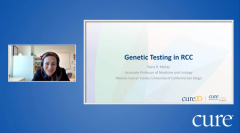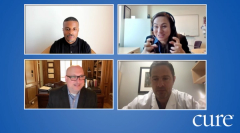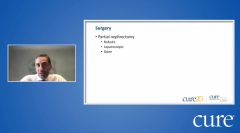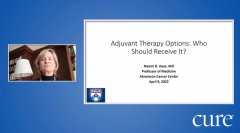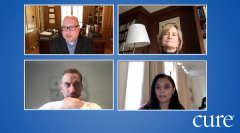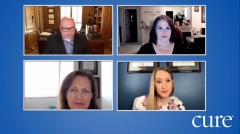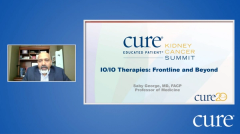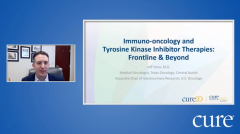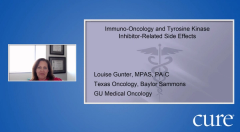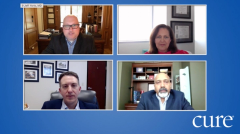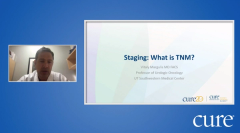
Educated Patient® Kidney Cancer Summit Combination Therapy Panel: April 9, 2022
Watch Dr. Thomas Hutson, Dr. Saby George, Dr. Jeff Yorio and Louise Gunter answer questions about combination therapy, during the CURE Educated Patient Kidney Cancer Summit.
Episodes in this series

This panel featured Dr. Thomas Hutson, Dr. Saby George, Dr. Jeff Yorio, and Louise Gunter.
Hutson: You all can jump in as you would like to. But the first question is, does immunotherapy affect other autoimmune diseases? Saby, you want to take that one?
George: Yeah, definitely immunotherapy, like checkpoint inhibitors – Opdivo (nivolumab) and Yerboy (ipilimumab), the drugs in that class – can definitely affect autoimmune diseases. They have the tendency to make it worse in some situations. So generally speaking, if patients have autoimmune diseases like severe rheumatoid arthritis, or severe Crohn's disease, which require systemic treatment in the form of immunosuppressants, we tend to stay away from using immune checkpoint inhibitors as the first-line treatment. While we have treated (people) with autoimmune diseases using these drugs, we have done that in select cases. And when patients run out of treatment choices for the cancer, that's something that they consciously decide to go on it, knowing that, you know, it could have the potential to make it worse. But you know, our approach will be to deal with it, if indeed, autoimmune problem gets worse and manage it very, very aggressively. So we have done that in a handful of selected patients.
Hutson: Yeah, and I think that comes in line with, you know, having these kind of informed decision-making discussions with patients. I just saw someone the other day that is in the (peri-procedural myocardial infarction) state. So they've had a myocardial infarction, but it would be similar to someone who had like an acute pulmonary embolism or someone that had a stroke or something, and you're in this acute four- to six-week window afterwards. And we've always had to deal with this, you know, because the drugs we use, sometimes can exacerbate that. So you have to have that educated discussion with the patient and make them well informed and then individualize your answer. So I agree with you. Absolutely.
There's a couple of questions here, which I think we'll throw to Jeff here since he did the IO/TKI talk, there's really two that I'm looking at here. One, comes down to length of therapy. So after two years with the CAR(-T cell therapy), how does one decide to continue or stop (Keytruda [pembrolizumab])-(Inlyta [axitinib])? And then the other one was, Is there any data on whether a long-term patient on a single TKI would benefit to switching to immunotherapy and vice versa? So I guess they're trying to say they're having maintained benefit on their current regimen? Should they stop and go to add stuff on or not? So kind of two different questions, but we'll see if you can handle it.
Yorio: Okay, I'll do my best. So the first question, somebody's had a complete response to treatment. They’re on combination treatment like pembro-axi, do we ever think about stopping treatment? And it's a good question. You know, on the trial itself, they only use pembrolizumab for two years, and then stop. In practice, you'll see often people continuing on immunotherapy if they're responding, sometimes even beyond the two years. And I think that's always a tricky and tough discussion to have. As we go forward, you know, some of it depends, you know, certainly complete responders. Sometimes I have that conversation. Some of it depends on the side effects that patients are having. You know, are they having pretty minimal side effects versus a lot of side effects? Do we think about at some point, tailoring off of one of those treatments, you know, stopping the immunotherapy and just staying on the TKI alone? And so I think the issue is, the data is not well known in that space. And a lot of us, I think, are having these conversations with patients and trying to make decisions based on how they're responding to the medicines, what kind of side effects they're having, and how comfortable we are about taking them off of it. You know, I think with those combinations, you do still see at some point down the road that you might see progression again. And so that's always the worry about taking people off of these drugs.
As far as the other question was, you know, somebody's been on a long-term TKI and it sounds like they're responding well, is there any benefit to adding either immunotherapy or switching to another immunotherapy TKI combination? And my typical sort of practice, and I think probably most people share this, is if it isn't broke, don't fix it necessarily. I mean, if somebody has been on one TKI for a really long time I would probably tend to just keep them on that drug because they'd been responding at that point. And not necessarily switch them to something else or add the immunotherapy, however, have a low threshold to do those things if they started to show any signs of progression at that point in time.
Hutson: There were some tough questions here that I'll just throw out there. There's some that are side effects. But I feel like, I don't want to throw Louise under the bus with some of these toughies because I don't know that there's a good answer to them. But let's start off with another kind of treatment-related one. And maybe whoever knows the answer to this may be savvy, may know this. But can you provide any information about the combination of a checkpoint inhibitor with a TKI and an IL-2 cytokine, like Bempeg? Like doing some of the cytokines plus checkpoint inhibitor and TKI? Yeah, that would be like a triplet therapy. I'm not familiar with any data there.
George: Yeah, we don't have any published data on that. You know, there have been big studies ongoing, but I don't have any published data to share.
Hutson: Like some type of pegylated cytokine, certainly we did those back in the day, you know. That was kind of how my career started in 2000.
Is there anything patients can do to help with severe fatigue and chronic kidney disease caused from the RCC? So maybe Louise can answer and maybe one of the docs can see what they would they have to chime in? Because there could be some medical reasons for this.
Gunter: I did mention just balancing activity with frequent rest, but a lot of times with chronic kidney disease, you'll just be anemic. And that means your red blood cell count is low. And it's a tough one to battle.
George: Yeah, so I will also chime in here. So fatigue is common to pretty much any anti-cancer drug, here, particularly TKI and checkpoint inhibitor. So, fatigue could also be from the cancer itself. And many reasons can be fixed. You know, hypothyroidism, as Louise mentioned earlier, is one of the reasons for fatigue. And then deconditioning also, so we can fix whatever we can fix and, and then for the conditioning, you know, regular exercise, having a Fitbit or watching your stuff daily, etc., will help you make sure that you do more the next day than the day before. So those are common advice that I give to patients on top of, you know, fixing medical issues that we can.
Yorio: And dose reduction. You know, I think we always think about that if somebody's having such profound fatigue, they're miserable.
Hutson: I've seen some folks who actually use stimulants, I tend not to employ them, certainly early into someone's treatment course, because it is a marathon and we do have patients that may survive years. And we do know, once you get on a type of stimulant that could be addictive. Although at end of life and trying to maximize quality of life, that would be the least of my concerns. But as I got someone into later lines of therapy is certainly with the discussion with palliative care providers. I've seen sometimes they'll put stimulants on and those are mainly used just to help the patient you know, it's a band aid, it's not fixing the root cause it's just giving someone a little bit extra energy and it won't work in every one. But sometimes, that's just enough to get the loved one to be more interactive with patients towards end of life.
Here's a question for everyone. (Welireg [belzutifan]), a drug that was approved for VHL patients. Is that the only place that could be used and what do we think about it?
Yorio: Right now, the approval of course is in VHL patients and primarily looking at patients who have multiple small tumors and trying to prevent further surgical interventions and ablations and things like that. You know, certainly there's some data in the metastatic setting for VHL patients as well as a way to try to use it for them. It's being studied in other patients that are not VHL, but not yet approved. But there are trials that are out there looking at belzutifan in non-VHL RCC.
Hutson: So I think is great hope and just so everyone knows it's a HIF alpha inhibitor. And so that's part of the great pathway. That's a step up from VEGF. Saby, are you aware of trials being done now to kind of incorporate that for all comers?
George: Matter of fact, we did participate in two trials, one is ongoing. One was a phase 2 trial of third- or fourth-line patients. We completed that study, and then another one is a combination in a phase 3 trial. I alluded to that trial there, but I didn't talk about the belzutifan. It looked at (Lenvima [lenvatinib])-pembrolizumab plus belzutifan versus lenvatinib-pembrolizumab plus MK-1038. So that's a triplet trial in the treatment-naive setting. So it's been applied in a lot of other settings. And know that a phase 1 trial was reported showing some efficacy. But now the labeling is only for VHL disease. I don't think I would use it in all the RCC patients yet.
Hutson: Is there any reason to think, and we don't have data to tell us or any reason to think it would be less efficacious than a VEGF inhibitor, and then is not the hope that maybe there will be a better tolerance to it?
George: It's really hard to say because, you know, we don't know how the toxicity will pan out, you know. Hypoxia episodes have been reported in the studies. So we don't know the safety. And the safety is crucial in maintaining the efficacy if it works. So if a drug works, but cannot be tolerated, then that's a problem. But if drug works, and it can be tolerated for a long time, then that can translate to long-term efficacy. So I don't have the answer. That's a great question.
Hutson: You're a little cautious that I can't stick you out on the line there to hold you accountable to anything. Okay.
We've got a couple other things. There's a question about clinical trials that we've talked about them, and in most require that you go to a location where the clinical trials done, and that, certainly for many patients, where most patients get their care and in a rural more rural setting, or receive care from community oncology that may or may not have access to trials, you know, what can be done about that? How can that be addressed? Jeff and I, and Louise, we’re in US oncology. So we are a practice of community oncologists. And we do have various clinical trials available for us, but anyone have any other solutions for how to act? How to how to deal with that problem? Not everyone can see Saby George.
George: Well, you bring up a very good question. I do have patients coming from five and six hours away, one way, to be on trial, because we cater to a large region, anywhere West of Bolton, almost Vermont, Albany and west. And a lot of Pennsylvania, even though Virginia and Ohio patients come here, we do have Canadian patients. But that being said, if a trial is not available in the vicinity, you know, trying to obtain resources, to you know, maybe to travel to the place where a trial is available. That's something that I would suggest. I remember when I was in Cleveland, as Tom alluded to earlier, you know, early 2006 and 2007, I remember patients flying into Cleveland to participate in trials. One particular patient came from Oregon, every few weeks. So, I know it is a costly affair, but having, you know, advocacy groups and resources mobilized for these things, may be a way to go. We have a very motivated patient who wants to be on trial.
Hutson: The reality is that some won't be but I think that the one thing that you can ensure as a patient or a patient advocate or family member is that they're getting what would be considered best practice. And so, at the minimum, you know, we've got lots of effective therapies now and we're trying to push the limit with some triple therapy and stuff but that is still unproven whether or not triple therapy in these trials is going to be better than the current doublet therapy, but you at least want your patient to get the doublet therapy, you know, and so there are ways to make sure and sometimes getting a second opinion, even through telemedicine will help you know, make sure that you're aligned that way. And then do the best you can. But you know if you can travel for clinical trials, so be it. But thankfully, I remember back in the beginning when you could only access these therapies in clinical trial, when it was Sutent (sunitinib) versus interferon, and there was such a dramatic difference in outcome. Now, thankfully, we have, you know, many commercially available drugs and the size difference between a benefit may not be as great. So it's tough. I feel for the for the population there. And, you know, I guess, you know, echo what Saby says, to lead up to that.
Yorio: I was just going to add to also encourage people to certainly look and see where trials are available, you know. Like Dr. Hutson mentioned, you know, we tend to do a lot of them in, in our community practice. And sometimes people don't always realize we have such the breadth of, you know, field trials available. And they might say, “Oh, I was going to travel three or five hours to go did this.” And we might have a very similar trial, right there for them, you know, very close by.
Hutson: Absolutely. And even the cooperative groups, the SWOGs and these ECOGs, and the CLGBs, and ALLIANCE and all these different big names you hear about they often have community oncology practices associated with them, too. So getting on, you know, to clinicaltrials.gov, or one of the advocacy group websites, and you may be surprised at how close to a trial may be to you.
Yes, excellent. So let's see here, like we talked about, I think, maybe it was Louise mentioned something about protein. In concerns with that we know that proteinuria can be a side effect of some of these therapies, some people have heard that having lower protein in the diet is better for kidney function, because protein makes the kidneys work harder and whatnot. Is there anyone who has any concerns about protein? Or what do you recommend about protein intake? Anyone want to jump on that? That's such a great question. I look at albumin in my patients as a marker of just overall nutritional status. And I want to keep my patients albumins above three, oftentimes, they're competing with a high metabolic state, poor nutrition. And it becomes a self-fulfilling prophecy that cancer just wins the war when it comes to robbing the body of nutrition. And when they get low protein levels in their blood, then it causes fluid retention and whatnot. But anyone have any magic into what to do in those situations?
Yorio: I think it's a tricky situation, classically you think of people with some sort of kidney dysfunction, trying to be on these lower protein diets, and then we in the cancer world often think about people trying to be on more protein because they tend to get starved to protein through time. So that's a very delicate balance of trying to optimize nutrition. And I think, trying to incorporate nutritionist into care is really important as well to do the best we can.
George: Right. And I agree with that. And, you know, we also induce proteinuria with some of the TKIs and, you know, (Avastin [bevacizumab]), which used to be commonly used, but not anymore, commonly used in kidney cancer, so they cause proteinuria. And we do definitely have the nephrologist on board. If they are marching into like grade 3, renal failure, you know, and then getting to optimize medications, so that, you know, some of the anti-hypertensive shouldn't be done, making sure they get adequate blood supply to the kidneys. So the class of drugs selected in those situations will have to be in line with optimal blood supply to the kidney. So we do definitely have a nephrologist input also, on top of that.
Hutson: Just a warning, what I think we tried to do in my practice, at least is when we're getting people that are eclectic, and losing weight and have anorexia, we try to get them away from this concept in there as well, meaning loved ones who want people to be vegans and want to change diet and they want to do all these different manipulations in the hope that provides a benefit, but in that state, it doesn't, it actually robs the patient and they lose more weight. So I'm usually trying to tell patients to the first goal should be maintaining caloric intake to maintain weight. So you need calories to maintain weight. And that sometimes means eating pizza, or whatever it is that you like to eat, but you need your calories. And once you're able to maintain weight, then you can start working on the quality of your nutrition. But don't eat a bunch of lettuce and salads all the time if you're losing weight, because you're not going to gain weight from that. So you need to be careful from that and unfortunately, sometimes the internet's your friend, sometimes it's not your friend and there can be a lot of misinformation, you know, on things like you know, sugars feeding the cancer or, you know, make your blood alkaline and these things just aren't really applicable to the real world as we're fighting the cancer here.
The goal is really here now to get some fun Final thoughts as we close out are our time with everyone today. And I want to get an opportunity for everyone here on the panel to give some final thoughts for patients just you know, what should patients take home today from your presentations as they move out into the battle, and some words of encouragement. So we'll start with Dr. George, and then go to Dr. Yorio and end with Louise.
George: Thank you Tom for the opportunity. And I'm really excited to be here. To all the patients out there, you know, this has come a very long way from 2006 When I was a fellow, and survival more than doubled with all the new treatments. So having very trusting team to take care of your kidney cancer, medical oncologists, nurses, nurse navigators, nurse practitioners, all those people involved. And, of course, if you are not comfortable, definitely get a second opinion. But definitely get a second opinion from a higher center, don’t get second opinion from internet or from a smaller center. So that's the kind of advice that I have. And I'm really excited for all the patients out there, to see that a lot of them are doing well compared to a decade ago. So I'm very happy for all of you. And I'm excited about all the research that's going on.
Yorio: Yeah, thank you everybody for having me here today. And Dr. Hutson, for inviting me here, it is a great conference and great to hear other people's thoughts and everything. And, you know, I think just the last sort of, you know, 10-plus years, treatments have changed and improved upon what we were seeing, you know, 10-plus years ago. And that's fantastic. And my hope, for all the patients out there and people dealing with this awful disease, is that hopefully we'll continue to make drastic changes and improvements, just like we have the last 10 to 20 years. Hopefully, what you see with just the science and all the research going on is that exponentially we'll continue to see more things come up, come about. And so that's, I think hopeful for the future and exciting on what lies ahead. I always tell patients not to focus on some of the the survival curves and things like that because they start to get out of date pretty fast with how quickly our treatments have continued to improve.
Gunter: So I just want to leave you with today that you are your own advocate. Involve your family members, involve your friends, be able to ask for help and accept help. During this long marathon. The best thing you can do is keep a record of how you're feeling and openly communicate and report any side effects that you're having. Do not downplay them for fear of a dose reduction. But let's talk about it so that we can do the best we can to manage it and optimize it so that you can enjoy your life.
Raw transcriptions have been lightly edited for clarity.
For more news on cancer updates, research and education, don’t forget to

